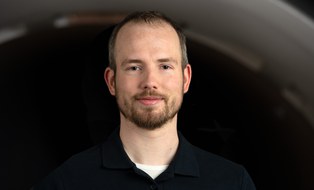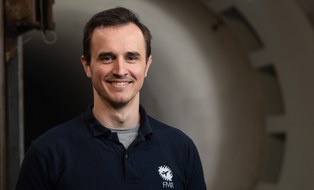Spacecrafts
Space systems play a significant role in scientific research and are also experiencing a steady increase in interest in the industrial sector. control systems are an essential part of every space system and are necessary to successfully fulfill the mission objectives. These include the successful launch and landing of a carrier rocket, the precise orientation and alignment of satellites for measurement and communication processes as well as the navigation and stability of lunar or Martian landers. Research topics encompass:
- the modelling of space-rated hardware for the simulation of realistic spacecrafts for the control design
- the modelling of the space environment and celestial bodies for the simulation of realistic missionsdesigns
- the design of autonomous controls systems for all missionparts, e.g. launch and landing fo rockets, attitude control of satellites or orbital maneuvers
- the evaluation of the performance and robustness of the control system in order to be able to make mathematically sound statements in unexpected scenarios.
Topics
The Chair of Flight Mechanics and Flight Control currently offers the following topics for student research projects and theses. If you are interested, please get in touch with the contact person for the relevant topic. Please refrain from multiple requests.
Motivation:
The sloshing behavior in the main tanks of a liquid rocket has a significant influence on its flight dynamics and can lead to the loss of the rocket in extreme cases. It is therefore important that these effects are taken into account when designing the controller for a rocket in order to guarantee the success of the mission. As part of this research project, an already non-linear simulation environment of the chair is to be expanded to include sloshing dynamics.
Task definition:
-
Literature research on the modeling of fuel sloshing at different mission times (launch, stage separation, landing)
-
Literature research on active/passive damping methods and their modeling
-
Derivation of a model for propellant sloshing in the main tanks of a liquid rocket for v
-
Implementation in a non-linear simulation environment in Matlab/Simulink
-
Design of a controller for active damping of the propellant slosh
-
Verification through reference missions
Contact person:
 © M. Kretschmar
© M. Kretschmar
Research Assistant
NameDipl.-Ing. Frederik Thiele
Send encrypted email via the SecureMail portal (for TUD external users only).
Motivation
Control systems for the autonomous landing of reusable rocket stages or on celestial bodies such as the moon or Mars must demonstrate a high degree of robustness and reliability. In most cases, test runs on the real object are not practically feasible without taking high financial risks due to a potential failure. The VTOL (Vertical Take-Off and Landing) test platform EAGLE (Environment for Autonomous GNC Landing Experiments) developed by the German Aerospace Center (DLR) offers the possibility of testing planned controller architectures ahead of time on a system with comparable, generally unstable system dynamics. In the future, the capabilities will be expanded to imitate the real behavior of spacecraft and thus verify the controllers designed for the mission.
The EAGLE's main thrust system currently consists of a kerosene-fueled turbine. This results in a high level of complexity in operation and maintenance, as well as in ensuring safe flight operations with high operating costs and low flexibility. For this reason, a conversion to a comparably powerful electric propulsion system is to be conceptually explored as part of this student project/diploma thesis. This should be able to be operated by built-in batteries, but also by cable if longer test campaigns with short distances are planned. The aim of the work is to find a configuration of a purely electrically powered EAGLE that represents an optimal compromise between capabilities and the effort/cost of the conversion.
Task description
- Analysis of the existing thrust system
- Research into the electrification of the thrust system
- Detailed comparison of possible conversion variants
- Selection and documentation of the best configuration
 © S. Ellger
© S. Ellger
Research Assistant
NameDipl.-Ing. Carl-Johann Winkler
Send encrypted email via the SecureMail portal (for TUD external users only).
Motivation:
The Verification and Validation (V&V) of a spacecraft control system is a challenging and resource intensive process. The physical models of the spacecraft, which is used for the design of the controller, are subject to uncertain parameters (e.g. masses or moments of inertia are only given within an interval in an early design phase or they can vary throughout the mission). It is still necessary to characterize the stability or the performance of the control loop while considering those uncertainties. Besides worst-case analyses, probabilistic methods are in the focus of attention, which give a probability distribution of those characteristics based on the distributions of the uncertainties. Polynomial Chaos Expansion (PCE) is a method to approximate this distribution. PCE promises a significant increase in computational efficiency compared to Monte-Carlo simulations, which are the classical method of probabilistic analysis. Multiple approaches for the efficient calculation of PCE have been developed, each coming with their own pros and cons.
Task definition:
-
Literature research on methods of PCE computation (focus on sparse/adaptive basis PCE)
- Implementation of some of those algorithms in Matlab
-
Evaluation and comparison on a benchmark satellite mission
Contact person:
Research Assistant
NameDipl.-Ing. Markus Lötzsch
Send encrypted email via the SecureMail portal (for TUD external users only).
If you are still unsure about your topic, we are also happy to offer general advice. Alternative options can also be presented based on the student's individual interests. We are also happy to support student theses with industry partners or initiative topics suggested by students. The contact person for projects about spacecrafts is:
 © S. Ellger
© S. Ellger
Research Assistant
NameDipl.-Ing. Carl-Johann Winkler
Send encrypted email via the SecureMail portal (for TUD external users only).
